6 Health Sciences faculty named 2023 Women of Impact
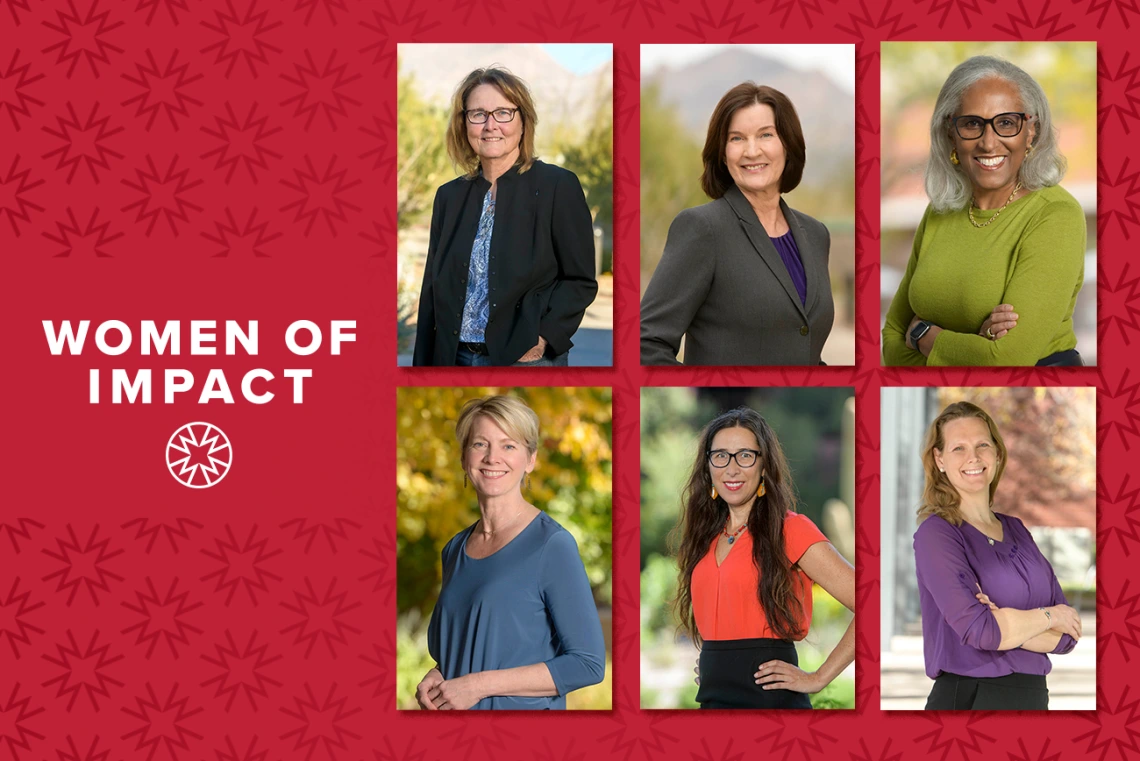
Six women from the University of Arizona Health Sciences received University of Arizona Women of Impact Awards from the office of Research, Innovation and Impact on Oct. 20. Thirty female faculty and staff members are being honored.
RII’s website notes that the Women of Impact Awards were created in an “effort to embrace and empower women, who through their work at our university, are laying the groundwork for a better future,” and that the awardees “have contributed to our identity as a world-class research enterprise. Among other criteria, the members of this class were selected by our committee based on their commitment to our mission and values, an application of skills toward discovery and innovation, the enrichment of our community, and the empowerment of others to ensure lasting change.”
Members of the 2023 judging panel included representatives from RII, Tech Parks Arizona, Tech Launch Arizona, the Office of the Provost and Faculty Affairs, Government and Community Relations, and Marketing and Communications. About 200 women were nominated this year.
The six Health Sciences awardees are:
Terry Badger, PhD, RN, PMHCNS-BC, FAAN
Director, Research Initiatives; Eleanor Bauwens Endowed Chair; professor of Nursing, Psychiatry and Public Health — College of Nursing
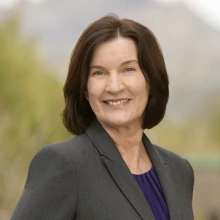
Terry Badger, PhD, RN, PMHCNS-BC, FAAN
Badger on the award: I am incredibly honored that my peers consider me a Women of Impact and nominated me for this award. We have so many outstanding women in research and innovation at the University of Arizona, and I have been privileged to work with many of them at the UArizona Cancer Center.
The University of Arizona Health Sciences, UArizona College of Nursing and Arizona community have provided an incredibly supportive environment. Without an amazing research team of staff and faculty at the University of Arizona and UArizona Cancer Center, I would not be able to move my research into practice. My research in symptom management with diverse cancer survivors and their caregivers is important for achieving health equity and quality cancer care in our community.
I have been so fortunate to work with creative scientists here in Arizona and across the country.
A message to women entering health sciences professions: It is critical you follow your passion, think creatively and develop an interdisciplinary team early in your career. When you work together and recognize the strengths of investigators, staff and community members, you can succeed.
Stephanie Russo Carroll, DrPH, MPH
Associate professor of Public Health and in the American Indian Studies Graduate Interdisciplinary Program; associate research professor, Udall Center for Studies in Public Policy and the Native Nations Institute; affiliate faculty, College of Law at the University of Arizona (UA); and, director, Collaboratory for Indigenous Data Governance — Mel and Enid Zuckerman College of Public Health
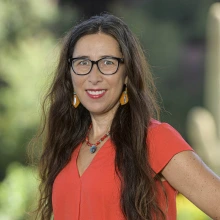
Stephanie Russo Carroll, DrPH, MPH
Carroll on the award: I am humbled and honored to follow in the footsteps of last year's honorees, particularly Karletta Chief, PhD, and to sit alongside my Indigenous sisters Ofelia Zepeda, PhD, and Valerie Shirley, PhD. I am grateful for the support of those who nominated me.
Over the past six years, the Community, Environment and Policy department at the University of Arizona Mel and Enid Zuckerman College of Public Health and the Udall Center/Native Nations Institute have given me the space to grow the Collaboratory for Indigenous Data Governance. [RR1] My Indigenous Data Sovereignty work draws on the UN Declaration on the Rights of Indigenous Peoples that reaffirms the rights to control data about their people, communities, lands, languages and cultures.
I do this work for my children's children and my ancestors. I am indebted to them, my parents, family, friends, and my partner. I am incredibly grateful for the collegial, mentoring, and co-conspirator relationships I have with the members of the Collaboratory for Indigenous Data Governance, the U.S. Indigenous Data Sovereignty Network, and the Global Indigenous Data Alliance. Tsin'aen Nek'e'ltaeni for the everyday blessings that renew and revitalize my commitment to this work.
A message to women entering health sciences professions: Lead with love and bring your whole self to your work. Life is a journey, and our professional lives likewise include predetermined destinations, wanderings, explorations and time for rejuvenation. Always seek more mentors. To quote one of my mentors and friends, Dominique David-Chavez, PhD, “I am an ‘un-disciplinary’ scientist, an Indigenous woman who resists disciplinary labels in order to conduct science in service to communities.”
Anne Cress, PhD
College of Medicine – Tucson vice dean, Operations and Strategy; professor of Cellular and Molecular Medicine; professor of Radiation Oncology
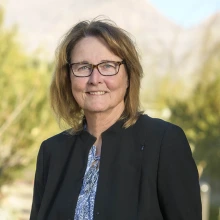
Anne Cress, PhD
Cress on the award: I am honored by this award and grateful for the UArizona Health Sciences opportunities to lead and implement team science. As a founding faculty member of the UArizona Cancer Center, I have seen firsthand the power of multi-disciplinary teams of physicians, scientists, educators and community leaders to implement and sustain a shared initiative. Sustaining an initiative requires hard work and creativity to remain at the forefront and have a national and international reach – all possible because of the outstanding UArizona academic environment.
The university provides first-rate faculty and trainees at all levels who can contribute to a sustainable team science and become national and international leaders to have a lasting impact. This award should send a powerful signal that women leaders are highly valued and team science efforts are rewarded, sustainable and impactful.
A message to women entering health sciences professions: Two quotes come to mind: “Staying focused is how to succeed in your career and life,” and “Success unshared is failure.” Combining both ideas will lead you to achieve your goals and ensure the sustainability of your contributions.
Kacey Ernst, PhD, MPH
Mel and Enid Zuckerman College of Public Health; professor and department chair, Epidemiology and Biostatistics; member of the AEGIS Consortium
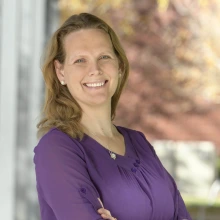
Kacey Ernst, PhD, MPH
Ernst on the award: I have been at the University of Arizona for 15 years and I know many of the other awardees. I am honored to be among this extremely accomplished group of women and fortunate to have had a dean and department chair who believed someone with no post-doctoral experience and one publication to their name could be successful. The open and collaborative atmosphere at the University of Arizona has really fostered my success. The growth of the UArizona Health Sciences research support has made research productivity much more efficient than when I started.
A message to women entering health sciences professions: Follow your passion. Find people who are fun to work with. Treat everyone with fairness and respect. Be open to new ideas, methods and disciplines.
Felicia Goodrum, PhD
College of Medicine – Tucson, Interim associate department head, Immunobiology; professor, Immunobiology; professor, BIO5 Institute; member of the AEGIS Consortium
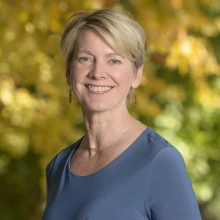
Felicia Goodrum, PhD
Goodrum on the award: Women have always been foundational pioneers in science, but often not recognized. I am heartened by the increased recognition of contributions made by women and people from other underrepresented groups in science. I am very honored to be recognized by this award for the work done by my fantastic group of trainees. Mentoring trainees in the art of discovery is the greatest gift and reward of academic science. I hope to inspire other women to see science as a strong and welcoming place for their creativity and talents. Women have incredible and unique attributes for scientific inquiry and are remarkable leaders. I am so grateful for the honor of blazing trails for others.
UArizona Health Sciences, the UArizona College of Medicine – Tucson, Department of Immunobiology and the BIO5 Institute have all contributed greatly to my success in so many ways – from the openness and support offered, the low barriers for collaboration, and the collegial atmosphere for scientific growth to the pioneering atmosphere for discovery.
A message to women entering health sciences professions: Recognize and value your unique attributes for science – they are your superpower. No one knows everything, but by being open to collaboration and by maintaining a growth and learning mindset, there is little you cannot do. Follow your passion and your science to your purpose – I really cannot imagine a more exciting career than that offered by scientific discovery. My greatest achievements have come from following the path the data forges, not the one I designed!
Juanita L. Merchant, MD, PhD
College of Medicine – Tucson, Interim director of the UArizona Cancer Center; Regents Professor; professor of Medicine; chief, Division of Gastroenterology and Hepatology; member, Cancer Biology Program and associate director for Basic Sciences, Cancer Center
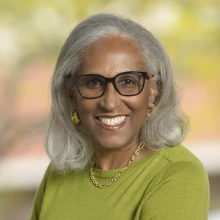
Juanita L. Merchant, MD, PhD
Merchant on the award: I’m incredibly proud to be a member of the University of Arizona Health Sciences and honored to be selected as one of this year’s Women of Impact Award recipients. I am pleased to see our department and the College of Medicine – Tucson invest in early-stage investigators destined to bring novel innovation and treatment approaches to Arizona. I am fortunate to be able to mentor and encourage this talent. In addition, the research environment at the University of Arizona has made it easy to form collaborations with colleagues in various disciplines that have infused my scientific knowledge with novel ideas and approaches.
A message to women entering health sciences professions: Follow your passion, trust your instincts, and do not fear failure. Sometimes, it’s what doesn’t work that teaches us the most significant lessons. When the going gets tough, your passion usually allows you to exit the other side.

